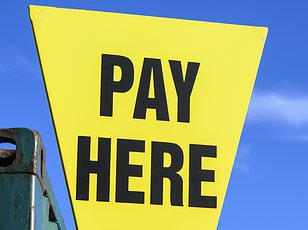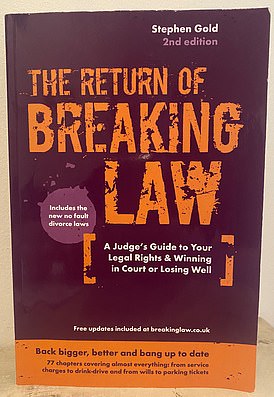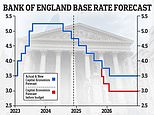How to beat an unfair private car parking ticket, by retired judge STEPHEN GOLD
Retired judge Stephen Gold explains how to beat unfair private parking tickets.
Issuing parking tickets is big business.
Around 35,000 tickets are issued every day for alleged infringements of the conditions for leaving your vehicle at private car parks, everywhere from supermarkets to blocks of flats.
That does not include charges issued by councils for parking on the street and in their own car parks, or fixed penalty notices issued by the police.
They have their own rules and routes of challenge which are outside the remit of this guide, although some of the grounds we are going to look at for private car park tickets might apply to council car parks too.
Getting a ticket after parking in a private car park does not mean you have committed any offence.
It won't lead to a criminal conviction, whether or not you pay it, and it is most unlikely that your neighbours will shun and avoid you when they get to hear about it.
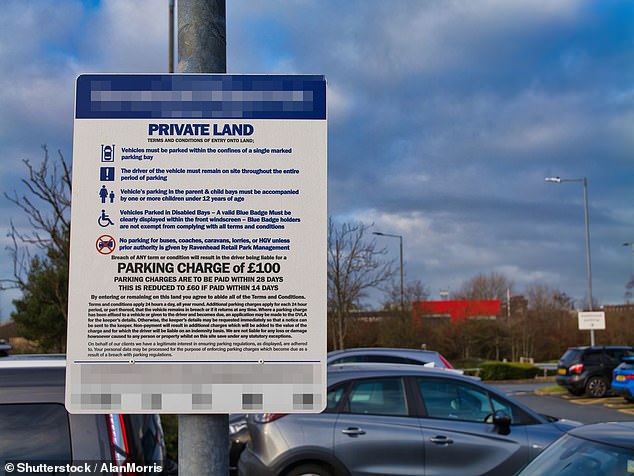
Industry code of practice: New rules cover signage about charges in car parks
But you can challenge a ticket that has been wrongly issued, and the challenge could take you to the county court where the park operator would have to sue you for non-payment to have any hope of getting you to pay up. That would be their only option.
When sitting as a judge, it fell to me – when not making debtors bankrupt, granting injunctions to domestic abuse victims, deciding child care arrangements or dividing up income and property on divorce – to try a number of these cases.
Coming up is a selection of some of the best defences that have succeeded in the county court, so park here for a while.
Any of the defences to a county court claim against you would be usable in the earlier stages of a dispute - both an initial challenge to the car park operator, and a second bite with an independent appeals service.
Where operators have broken their own code of practice, the probability is that one of your appeals will succeed.
So, let's take a closer look at the private parking penalty business, why drivers often feel tickets are misconceived or unreasonable, and the battle to get a code of practice in place.
Then we will explore how to mount a successful appeal if you feel you should not have received a parking ticket.
How to get stung for £100
Your registration plates are liable to be snapped on entry and snapped on exit to a private car park, and don't you dare make a rude sign.
If you are unlucky, what in due course will come whizzing through your letterbox will be a parking ticket for overstaying your welcome, parking where prohibited or parking outside the designated bay.
If you were meant to pay for parking at a machine and failed to pay anything, or enough; or failed to display the ticket in the required position on your windscreen, an attendant in a high visibility jacket will do the job of the cameras and might even take a picture as well.
The car park operator – provided they are members of one of the two trade associations, British Parking Association and International Parking Community - will get the DVLA to grass on the identity of the vehicle's registered keeper and address for a £2.50 fee.
Then the operator will look to the keeper, who will probably have been the driver, to pay up the penalty involved. If the keeper was not the driver, then the keeper can get off the hook by telling the operator whom they should be chasing.
Government code gone missing
In many instances, penalties have been exorbitant; signs telling drivers what they can and cannot do have been few and far between and obstructed by foliage, cluttered with flea-sized wording or misleading; and demands for payment aggressive.
That's why the Parking (Code of Practice) Act 2019 was passed requiring the Government to introduce a code of practice for private parking.
They came up with a proposed code, only to temporarily withdraw it four months later because of High Court challenges by several operators.
Five years after the code legislation, no redrafted statutory code has surfaced. Will it ever come? After all, the Government has obligations under the 2019 Act.

Stephen Gold: The last Government came up with a proposed code of practice only to temporarily withdraw it four months later because of High Court challenges
I asked our new Government. A spokesman said – cue drum roll – 'The Government will announce its intentions with regard to the implementation of a Government code of practice in due course.'
A free overnight stay at a car park of your choice if you can guess the action the two trade associations have taken.
In what is widely seen as a massive ploy, they have brought out their own 57-page private parking code of practice which its members must follow or risk having their membership terminated or suspended, and thereby be paralysed from getting vehicle keepers identified by DVLA.
Yes, there are positive aspects to it, but I think it falls short in two major respects.
The withdrawn Government code would have generally capped the penalty that an operator can impose at £80 in London and £50 out of London and, in both cases, have allowed a 50 per cent discount for payment within 14 days.
The associations' code requires a cap of £100 in and out of London and a discount of a minimum of 40 per cent (which is unlikely to be exceeded).
It allows up to £70 to be added on to the penalty where payment is not made in time to cover the expense of recovery.
The trade associations are probably on tenterhooks. Will their code appease the government, or will it finally press ahead with its own code or legislate on what operators can sting you on for being naughty?
Your vehicle could have clapped out before we know the answer.
Operators should follow the trade associations' code as from 1 October 2024. There's a big exception to that.
Existing operators have until 31 December 2025 to comply with the rules on signage in view of the large number of parks involved and the cost of necessary changes.
This doesn't say much for the general standard of signage so far.

Getting a ticket after parking in a private car park does not mean you have committed any offence - it won't lead to a criminal conviction
The process of appealing an unfair ticket
1. The operators and their code of practice
You can challenge the parking ticket to the operator within 28 days of its receipt (longer if exceptional circumstances can be shown) which must honour a new appeals charter.
The downside to doing this is that you may forfeit the discount for settling within 14 days, so don't challenge unless you reckon you have a reasonable chance of winning.
Breach of the code ought to nicely set you up for success. However, if you are a serial penalty ticket collector, the operator may refuse to entertain your challenge.
Ideally, read the private parking code of practice and, if necessary, pop back to the car park to check whether the code has been fully adhered to (but don't overstay).
The code itself recommends letting you off the penalty where you are meant to input your registration number but have made a minor keying error.
And a reduction in the penalty to £20 so long as you settle within a fortnight is recommended where you can prove, for example, that:
- You overstayed because your vehicle had broken down (what generosity!);
- You overstayed because of the onset of illness, a medical appointment that had overrun or delay resulting from childcare arrangements;
- You paid up at the park but made a major keying error when inputting your registration number (for example, previous car or swapped characters);
- You failed to display a necessary permit which would have covered the parking, but came up with a copy of it subsequently;
- You would have been permitted to park where you did had you inputted your registration number, but failed to do so;
- A payment machine was out of operation, no alternative means of payment were available, and you could not reasonably be expected to have accessed any other machines in the park that were working.
The code requires a grace period of 10 minutes to be allowed by the operator during which a parking charge must not be issued.
This is where there is a time limit for free parking, or what you should pay is based on how long you remain. It does not apply to short-stay parking not exceeding 30 minutes.
In addition, a consideration period, usually of a minimum of five or 10 minutes, is to be generally discounted from the stay to take account of the time a driver needs to find and access an empty bay and to read the signage and so on.

What happens if you don't pay the penalty, whether or not you have unsuccessfully appealed? There is only one thing the operator can do. Sue you in the county court
2. Independent appeals services
Should the appeal to the operator fail – and remember that the operator is cutting its own throat every time it caves in – you can have a second bite at the cherry by appealing to the independent appeals service open to you.
This is Popla for British Parking Association operators (excellent website) and the IAS for International Parking Community members.
The appeal has to be made within 28 days of rejection of the first appeal and is free.
You can rely on the same grounds you used for your first appeal, but mitigating factors will generally not be enough to earn success unless a minor keying-in error was involved.
If the operator does not belong to either of the trade associations, that means both that the code does not apply, and no right of appeal exists.
Of course, you can always ask them to see sense and warn them that you will defend any civil claim they choose to make against you - a matter I will come to below.
According to the code, the logo of the trade association to which the operator belongs should appear on the sign at the entrance to the park.
3. The county court
What happens if you don't pay the penalty, whether or not you have unsuccessfully appealed? There is only one thing the operator can do.
Sue you in the county court. That's what usually happens.
But please bear in mind that the approach of the judge will be different to that of the operator or independent appeals service on considering your appeal.
The judge must decide the case solely on the basis of the relevant statute law and contract law, and not on the basis of what was in a trade association's code of practice - or on the basis of any future Government code, if and when it shows its face.
In some situations – where, say, you overstayed as a result of an emergency – you would be better off under the code than before a judge.
If you do nothing, the operator will obtain a judgment against you without any hearing.
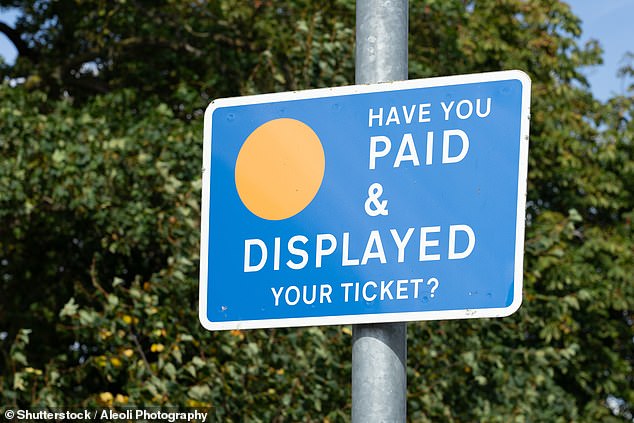
Defending a claim in the county court: One big development with small claims which came about five months ago was the introduction of 'compulsory mediation'
That will increase the bill, as added on to the unpaid penalty and any debt recovery fee sought will be the court fee for starting the case at £35 and, if the court papers have been drawn up by a solicitor, a further £50 with an additional £22 if the solicitor is still in the picture.
Interest at 8 per cent may also be applied to the penalty and recovery costs. Mr and Ms Bailiff will pay you a visit if you still refuse to show the colour of your money.
And if you put in a defence, the case proceeds to a full hearing and you lose, added on to the penalty for which you will be liable will be the same £35 and £50 plus a trial fee of £27.
It is uncommon for operators to call witnesses in the flesh for these cases and so you should not have to pay any witnesses' expenses.
Unless the judge exceptionally finds you have behaved unreasonably in the case, you would not be condemned to pay the operator's legal fees for having a lawyer at court to represent their interests at the final hearing.
Behaving unreasonably would require something like a really crazy defence, or you having told a large pack of porky pies.
These additions to the bill should you lose will rub salt into the wound but, financially at least, the loss should not be the end of the world.
Perhaps one of the most irritating factors will be the need for you to spend the day, or part of it, at court.
In some courts, though, it is practice under a pilot scheme for these cases to be dealt with on paper without any personal attendances where there is no objection to this from the parties and this practice could soon spread.
The chances are that if things have gone as far as the county court you will be defending the claim.
You will not be precluded from defending because you made no previous appeal or did so but were unsuccessful.
Once you put in a defence to the county court claim, the case will be heading for a hearing as a 'small claim'.
One big development with small claims which came about five months ago was the introduction of what is called 'compulsory mediation'.
A trained mediator provided free of charge by the Courts and Tribunals Service will spend up to one hour on the phone, bouncing from one party to the other, in an endeavour to get them to reach a settlement.
It is not strictly 'compulsory' but non-engagement in this mediation will look bad, will have to be explained to the court and may lead to the party who fails to play the game being penalised in costs when the case is heard.
The mediation catches parking cases and I fancy that operators will not like it because it will slow down the recovery process and be an administrative irritation for which they will not be paid.
They may now factor it in to their decision on whether to go ahead with the case once they have seen your defence.
4. Enforcement of a judgment
If you lose in the county court, do not worry about a so-called 'CCJ' (county court judgment), which is shorthand for registration of a judgment against an unsuccessful defendant to civil proceedings with Registry Trust Ltd and represents a black mark for credit purposes.
The judgment will not be registered there as you had defended the case.
But if you do not satisfy the judgment it will become registrable should an order be made for it to be paid by instalments, or the operator takes certain steps to enforce the judgment through the court.
This was where I entered the picture when I was a judge, and tried many such cases.
Successful defences against private parking tickets
Here is my rundown of the best defences against car parking tickets, including some from cases that came before me.
They can also work earlier in the process, before you get anywhere near the county court, as grounds for an appeal to the operator and one of the appeals services.
1. The 'I knew nothing' defence
The operator must prove that you agreed to its conditions: if and when you would have to pay, and what would happen if you did not pay.
It will be unable to do this unless it can show that the conditions were displayed on one or more notices at the car park which a reasonable motorist would have seen, even if you did not see them because you drive and walk facing the sky.
Perhaps there were no notices (unlikely); the notices displayed were absent from the route you took in and out (possible); the notices were obstructed in some way and could not be read (possible); or that you could not have been alerted to the fact that the notices displayed conditions by virtue of their appearance, size and inconspicuousness (possible).
If you only discovered the conditions on returning to your vehicle and could not have reasonably known about them when you parked, this defence is still intact.
The car park operator will almost certainly rely on written evidence at the hearing which will include photographs of the signs containing their conditions.
But sometimes the photographs will fail to establish where exactly the signs were displayed in relation to where you were parked and the route you would have taken to reach that point.
The best evidence you could come up with would be your own photographs backing up your case.
And if the operator has changed or is changing its signage in response to the new code (see above) that may indicate that the old signage was inadequate.
You may like to ask them about that before the case is heard.
2. The 'So what?' defence
If what the parking ticket states you did wrong was not against any of the conditions mentioned in the signs, you cannot be liable for the claim made against you.
For example, if you failed to display a parking permit at a car park for a block of flats and there was nothing on the signs about this being necessary, then you would not be liable.
3. The 'No right to extra charge' defence
Some operators are fond of trying to charge you for the administrative cost of pursuing you if you do not pay up in time.
The cost of recovery, they call it. However, if this is not mentioned in the signage, they cannot have it.
The fact that it is given the all-clear in the code is not in itself legal justification for claiming it in the county court.
If the signage says they can add on a charge without specifying how much, that does not entitle them to pick a figure out of the air.
The judge would want evidence of how the sum had been calculated and that it was reasonable.
But a successful defence on that part of the claim would not exonerate you from having to pay the charge for your parking misdeed.
4. The 'You should have pulled your finger out' defence number one
The operator has six years from the date of your alleged misdeed within which to start a county court claim.
They will generally be much quicker off the mark, but I have known of fatal delay, especially where they have had trouble locating the keeper or driver.
If the delay is within the six years and they are claiming interest, you may be able to persuade the judge to reduce the rate of interest or the period over which it is payable.
5. The 'You should have pulled your finger out' defence number two
The operator is subject to other time limits which will be fatal to the claim if not observed.
Where the ticket has been fixed to the vehicle or handed to the driver, the operator can apply to DVLA for details of the registered keeper if the charge has not been paid within 28 days.
Then it must ask the registered keeper for details of the driver or the money claimed within 56 days of the ticket's issue. Failing to meet that deadline is fatal to the operator.
Where the vehicle has been snapped, the operator can go to DVLA right away and then has just 14 days from snapping to send a notice to the keeper, to pay up or identify the driver, if not the keeper.
Again, failure to keep to that deadline will be fatal.
The communication, where posted, will be presumed to have reached you on the second day after posting with Saturday, Sunday and any public holiday ignored. For chapter and verse, go to the Protection of Freedoms Act 2012 schedule 4.
6. The 'It's nought to do with you?' defence
If the operator does not own the park, it will have been brought in to manage parking by the supermarket, lessor or managing agent of a block of flats or whoever is in control.
They will have made a written agreement with the operator to run the parking.
Often, the agreement will be for a fixed period, but that period may have expired which could be fatal to the operator as it will have lacked authority to act as it has done.
More than once as a judge, I have come across expired written agreements and no evidence that they have been verbally extended.
Ask the operator to prove their authority if they do not include a copy of the agreement they are relying on with their evidence.
The current code imposes obligations about this.
7. The 'Bye-law' defence
The park may already be subject to some form of statutory control, which is likely to be a local bye-law or statutory order or regulation and particularly if it is at an air or sea port or railway station.
If that control includes the power to impose civil or criminal liability in relation to parking there or parking your class of vehicle there, then it prevails over any authority the operator may claim to possess to issue their parking tickets.
I once dismissed a claim on the basis of this defence in relation to a car park at Southampton Docks.
8. The 'You must be having a laugh' defence
The charge for breaking the operator's conditions is unlikely to exceed £100 and, in that event, defending on the ground that it was too high will fail.
But with some rogue operators which are not members of one of the two trade associations, £100 could be topped.
The court would have to be satisfied with this defence that the charge was extortionate or extravagant.
If it was fixed simply to punish you or to line the operator's pocket and was ridiculously over the top then you might be off the hook.
A difficult defence to run but, materially over £100, never say never.
9. The 'I wasn't parked long enough' defence
If the signage prohibits you from being parked beyond a specified time, then time spent coming to park in your bay and getting out of the park should be disregarded.
If signage prohibits staying, remaining or having your vehicle present in the park (or words to this effect) then this additional time will usually be irrelevant.
But if your departure was delayed because of congestion at or before the exit you may be able to successfully argue that, but for that congestion, you would not have overstayed and that this made it impossible to keep to the time limit.
10. The 'There was no means of paying' defence
In one case I tried, the park signage gave an option to pay the parking charge through the parking app RingGo or by credit card.
But RingGo was not working and the driver did not have her credit card with her.
She left her car where it was and continued her attempts to get through to RingGo.
Ultimately, she did get through and she paid a charge calculated from when she had actually parked.
She got a ticket with the operator arguing that she could not pay retrospectively.
There was nothing in the signage stating that she had to park somewhere else in this situation.
I decided that it was the operator which was in breach of its obligations in that one of the options it was agreeing to be available to her was unavailable when needed.
It was impossible for her to do what should have been possible. The same principle should apply to an 'out of action' machine unless signage makes it clear that you cannot park.
11. The 'Technology was wonky' defence
If the technology used to time your car park visit is unreliable it will not be accepted as sufficient evidence that you have overstayed.
Casting doubt on the accuracy of the technical equipment could result in the dismissal of a claim dependent on the technology's accuracy.
Ask when was it last checked, what was the status of the checker, and how many other complaints were received in the months preceding and succeeding your visit that the equipment was wonky.
Couple this with credible evidence from you that you did not overstay ('Hand on heart, judge, and I go to church regularly') and it could result in the dismissal of a claim dependent on the technology's accuracy.
I had a dispute with Waitrose a few years back over the constant inaccuracy of the clock which determined the time recorded on the tickets dispensed at the park entry barrier - which demonstrates that machines can get it wrong.
Over a period of 10 months, that clock was persistently slow by up to 10 minutes. The error was reflected in the parking tariff you were asked for at the pay station on departure and so there was no overpayment.
The mischief was in the fact that customers were blissfully ignorant of the inaccuracy and would have been depriving themselves of up to ten minutes in parking time by counting the period their vehicle had been parked from the time on the ticket rather than their watch or mobile phone.
Eventually I complained and even offered (ticket in cheek) to send in one of my friends who is an expert in horology to fix the problem.
But after nine months I gave up at the risk of being reported to a mental institution and temporarily took my car elsewhere, until the clock was fixed.
12. The 'Lost ticket' defence
This one can be illustrated by a dispute I had with the same branch of Waitrose as above.
Its conditions provided that if a car park ticket dispensed on entry could not be produced a charge of £25 would be made. I knew this. The conditions were perfectly clear.
I lost my ticket in store. I had been in the store for approximately 30 minutes and had spent £44.05, both of which I was able to prove.
The duty manager said he would reduce the charge to £15 but would not go down further and refused to view CCTV footage to corroborate my evidence about the time spent there.
I paid the £15. I needed to get out of the car park! Once liberated, I asked for my money back.
I had what I regarded as powerful mitigation, including that five days later Waitrose had sent me discount vouchers which were described as my 'exclusive reward for our most loyal customers'.
I also contended that the penalty condition was unfair and unenforceable in that £25 was extortionate and/or extravagant (see the 'You must be having a laugh' defence above).
This, I explained, was because it failed to reflect the maximum period the vehicle could have been in the park.
It required payment of the same amount whether the vehicle had been parked for five minutes (for example, where the park opened at 8am and the lost ticket was reported at 8.05am) or the day's entire car park opening hours.
Waitrose eventually apologised for the way I had been treated and I accepted a £25 gift card.
Happy parking everyone
A further 35,000 tickets were issued since I started writing this.




